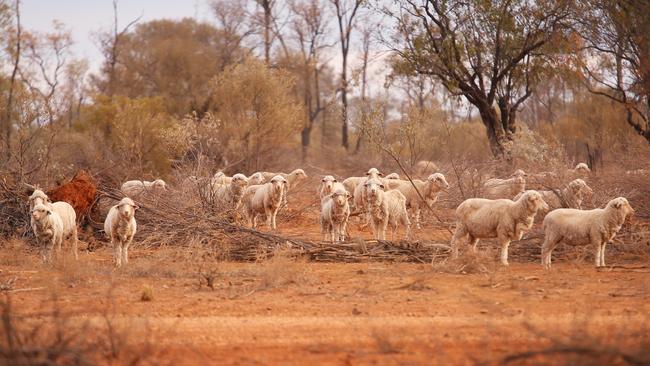Adopt a farmer: The families holding on tight in tough conditions
The drought is harsh and farmers need support but the rural spirit is still strong, writes Clare Armstrong
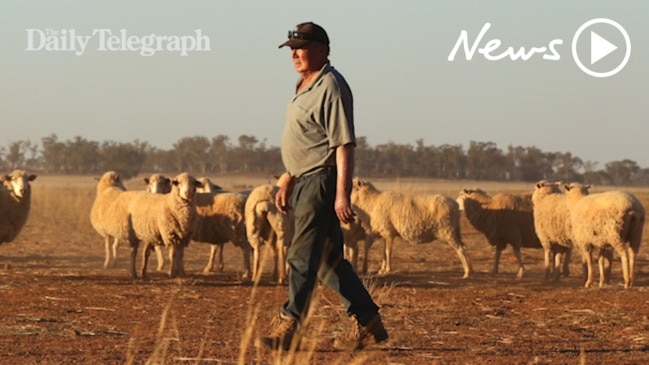
NSW
Don't miss out on the headlines from NSW. Followed categories will be added to My News.
- Tottenham Central School create a cook book for drought
- Adopt a Farmer and help them through the drought
When I woke to the sound of rain hitting the roof last week, I thought I was still dreaming. It shouldn’t have been unusual given the time of year, but here I was on the eastern edge of the NSW outback in the middle of the worst drought in living memory and water was falling from the sky. I couldn’t believe it.
Located about 650km west of Sydney, the small mining and agricultural town of Cobar has been crippled by two years of significantly below-average rainfall.
Like almost 99.5 per cent of NSW, the town has been drought declared for more than a year.
The community was extremely glad for the light rain, but that night on the news the weather report included an important caveat: this was not drought breaking.
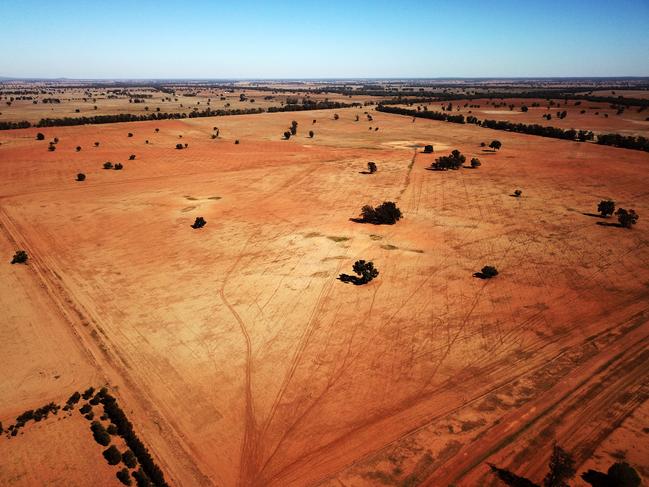
SUBSCRIBE TO THE DAILY TELEGRAPH: $12 FOR 12 WEEKS
Talking to farmers up and down central western NSW, they all agree it’s the longevity and breadth of the current drought that hurts the most.
In previous droughts farmers would send their stock up the road on “agistment” to graze on literally greener pastures.
They can’t do that anymore because every neighbour from Victoria to Queensland is in exactly the same predicament.
Most of the towns across NSW aren’t even getting the odd light shower.
DIRT OVALS
The drought permeates rural communities in so many different small ways.
Schools across the region have slowly had to let their sports ovals die as dams run out.
At Tottenham Central School in the geographic centre of NSW, the oval is a dust bowl of red dirt.
“When there’s no grass on the oval it really makes you not want to fall over,” Year 9 student Kyan Handsaker points out.
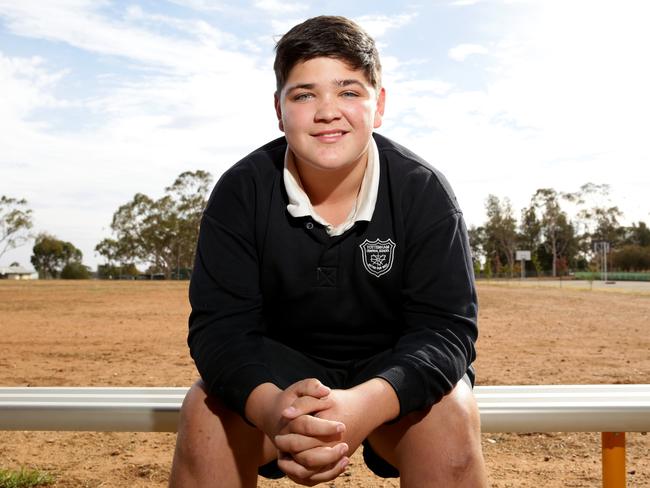
Like many of the students in the area Kyan works hard to help his parents run their property.
All the farm kids are adept at driving tractors, shooting pests, driving in fence posts and herding stock.
A gaggle of primary kids at Cobar Public School can barely stop laughing enough to tell me the story of how students at a school they visited on an excursion to Newcastle last year cried when they found out the country kids shoot cats.
“They’re feral animals so of course we have to get rid of them,” Drew Barton, 10, said in a matter-of-fact voice.
His classmate Mitch Allen said the “city kids” were even more shocked the farm children didn’t get paid to work.
“These kids are saying they get $5 to put out the washing,” he said.
“I couldn’t believe it, $5 just for that? I once herded an entire mob of goats all by myself and my dad gave me $20.”
Standing next to him Year 5 student Sosie Barton, 10, proudly adds “and we usually don’t get money, we do it because it’s fun”.
The kids delight in describing their daring scrapes out on the land.
Drew herds stray goats by coming up beside them on his motorcycle and hooking them onto his bike with his foot.
Mitch gives an enthralling rendition of the time he was bucked by a billy goat and landed flat on his face, while Sosie animatedly explains how she and her brother Rowdy rescued a baby emu.
KIDS HARDEST HIT
Despite their jokes and bravado, the kids aren’t immune to the impacts of the drought.
I repeatedly hear about how “dad doesn’t have as much time to play” or “mum has to help on the farm more now,” but even then there’s never any complaint.
Many children spend their mornings before school helping to feed stock, while weekends and holidays are “all hands on deck”.
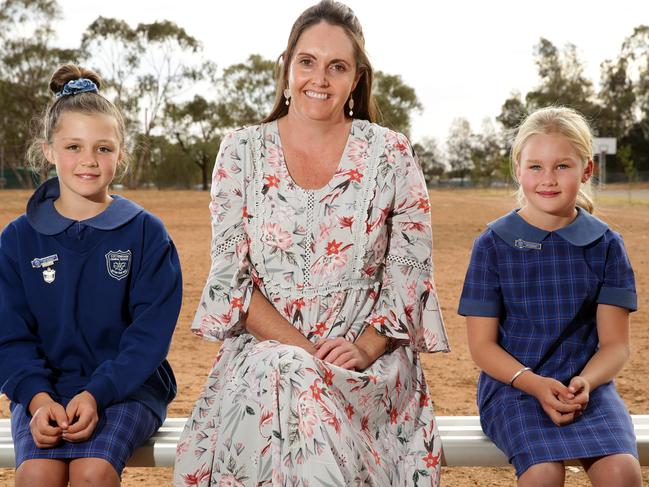
Tottenham’s principal Amanda Thorpe said families go to great lengths to shield their children from the burdens of the drought.
“The children are aware, of course,” she said.
“But the drought isn’t their fault and it’s not their responsibility. That’s why we try to keep school as normal as possible for them. We don’t want our students missing out because of a drought.”
Knowing these farmers are spending every spare minute of their days feeding stock or trying to generate income, it’s hard not to feel like an imposition when visiting.
WARM WELCOMES
Yet, without fail, at every home I received a warm, country welcome.
The moment I set foot in the Darcy family home in Tullamore my nose caught the smell of freshly baked scones.
Sure enough, as we rounded the corner the dining room table was set up with a pile of fresh scones tied up in a neat tea towel with a jar of jam and bowl of whipped cream.
The characters of the bush can sometimes be very direct, but they’re also always friendly.
After a late night stop at a local grocers to get supplies a young student from Tottenham called Bailey boldly came straight up to me for a chat — evidently a stranger in a small town sticks out from a mile away.
He’d been playing squash with his dad at the local community hall and stepped out at the same time I was preparing to set off into the night.
“You can’t possibly be driving now,” he said incredulously. “That’s insane, there will be a zillion kangaroos on the road.”
ON THE HOP
Fortunately kangaroo fatalities were avoided that evening, but I did think of Bailey every time one hopped along the side of the road.
Within days of the rain, tinges of green grass appeared in paddocks and along the sides of roads.
Farmers will run their remaining stock over the area to eat the greenery, known as “pick” but the soil below is as dry as ever before. Locals call it a “green drought”.
A decent amount of rain might encourage some farmers to plant crops like oats, wheat or lupins to feed their sheep and cattle through the next season.
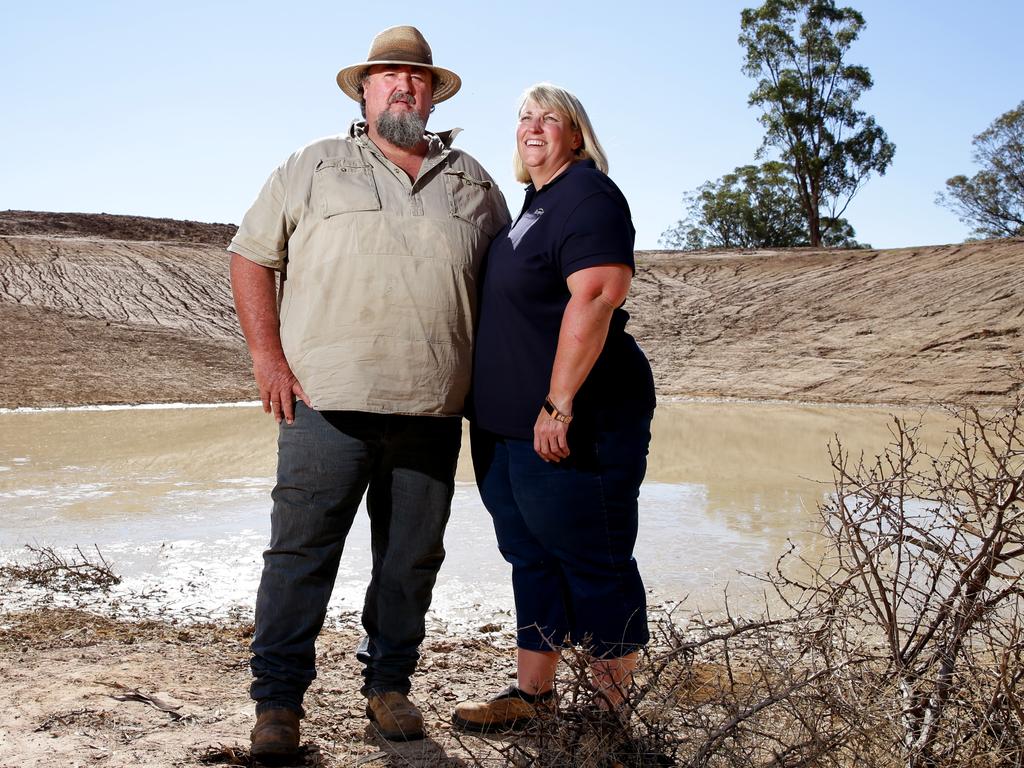
But as sheep farmer Richard Darcy helpfully illustrated in terms a city resident might relate to, without follow-up rain to do so would be like “planting a vegetable garden, watering it once and then walking away hoping something grows”.
Of course, these farmers aren’t growing a few kitchen herbs, they’re contemplating investing substantial funds at a time when savings are long gone and mortgages loom large, in the hopes a crop will stave off total disaster and keep their stock alive until the drought breaks.
Understandably they’re hesitant to plant a crop when there’s no guarantee the follow-up rain will come.
As winter approaches the colder ground will stop anything germinating, further decreasing the chance of producing a crop.
Rural communities have been doing it tough for a long time now, and there’s still no end in sight.
NO MONEY FOR NOTHING
As agricultural money drains from local towns, supporting small businesses like grocers, butchers, hairdressers and cafes also struggle.
Mechanics, shearers and other people who rely on farm work are also moving out of town as farmers destock because they’re unable to keep feeding animals.
Tullamore farmer Paul Guy admitted it would take years for the bush to recover, but like everyone working on the land, his steadfast stoicism shines through.
“It’s tough but you just get on with it,” he said.
“No point complaining about something you can’t control.”
As the drought stretched on, charitable donations to support farmers and regional communities have grown.
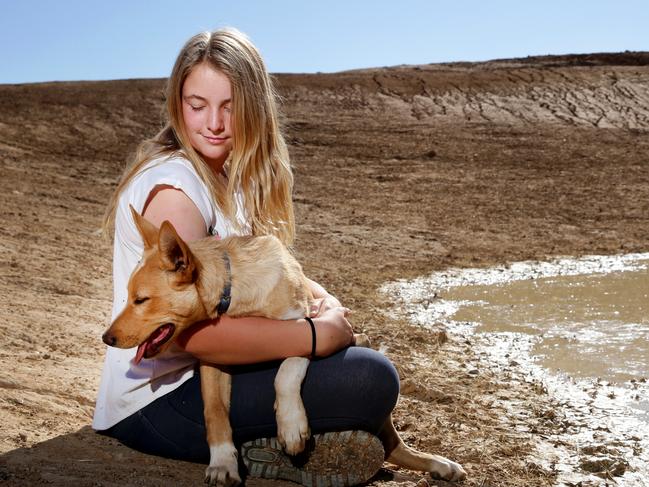
Simple gestures like a fuel voucher, bale of hay or a letter touch the families doing it tough. Mr Guy’s wife Noelene was in raptures about a food parcel sent by Rural Aid last year.
“Every little bit helps and this was so thoughtful, the parcel had everything in it and it wasn’t just old out-of-date donated food, it was a proper selection,” she said.
Hermidale Public School principal Skye Dedman said despite never having asked for help, she’s been increasingly contacted by schools and community groups from all over the state offering assistance.
The Daily Telegraph’s Adopt A Farmer campaign aims to raise $800,000 for Rural Aid to give every farm family on their register a $100 prepaid Visa card.
Ms Dedman has channelled donated funds into permanent projects, such as a new barbecue area the whole community can use.
“Just receiving that call, knowing someone out there has thought of you can make all the difference,” she said.
Even though these communities are fighting for survival each day, people are very quick to highlight someone who has it worse.
NSW farmers shake their heads over the recent floods in north Queensland and teachers tell their students one day it will be their turn to donate to a bushfire or natural disaster in another part of the country.
No matter where you go, the message from these communities is the same — “it will rain again”.
Everyone just has to hold on until then.

